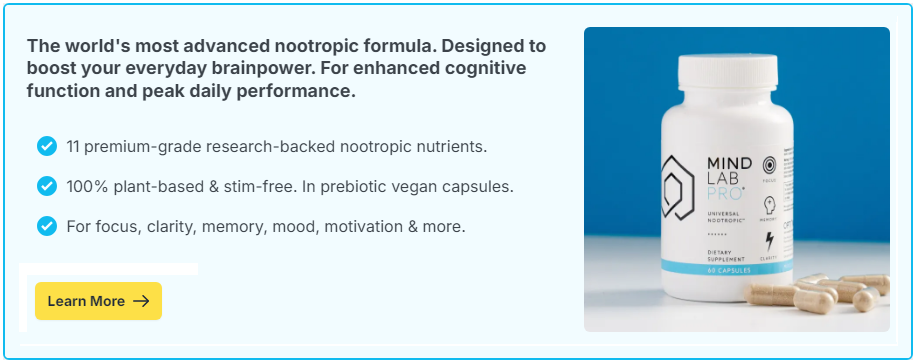
Statistical analysis is the backbone of data-driven decision-making. Whether in scientific research, finance, business intelligence, or epidemiology, statisticians and data analysts must process vast amounts of information, apply complex mathematical models, and ensure the highest level of accuracy in their conclusions. Given the increasing reliance on big data and predictive analytics, the cognitive demands on professionals in this field continue to grow.
Analyzing datasets requires sharp focus, attention to detail, and the ability to detect patterns and anomalies. Errors in statistical models can lead to flawed interpretations, making precision a top priority. Yet, maintaining peak cognitive performance over long hours of analysis can be challenging, especially when dealing with mental fatigue, distractions, or cognitive overload. To enhance their ability to concentrate, sustain accuracy, and improve mental endurance, many professionals are turning to cognitive enhancers—compounds and strategies designed to boost brain function.
Contents
The Cognitive Demands of Statistical Analysis
Statistical work is mentally intensive, requiring deep focus, problem-solving, and analytical thinking. The challenges statisticians and data analysts face include:
High Attention to Detail
Small errors in coding, calculations, or dataset preparation can lead to significant inaccuracies. Statisticians must meticulously review their work to ensure data integrity.
Sustained Focus for Long Analysis Sessions
Statistical modeling, hypothesis testing, and machine learning require deep concentration for extended periods. Mental fatigue can lead to mistakes, misinterpretations, or overlooked trends.
Rapid Problem-Solving
Unexpected issues, such as missing data or inconsistencies, require quick, logical problem-solving. Analysts must troubleshoot errors efficiently while maintaining productivity.
Memory and Information Retention
Remembering key statistical formulas, programming commands, and theoretical frameworks is crucial for efficient analysis. Cognitive fog can slow down recall and hinder workflow.
Managing Cognitive Overload
Working with massive datasets and multiple variables requires juggling vast amounts of information simultaneously. Cognitive overload can lead to burnout and reduced efficiency.
What Are Cognitive Enhancers?
Cognitive enhancers, also known as nootropics, are substances that improve brain function in areas such as memory, attention, and mental clarity. These enhancers fall into two primary categories:
- Natural nootropics: Herbs, amino acids, and plant extracts like ginkgo biloba, lion’s mane mushroom, and rhodiola rosea.
- Synthetic nootropics: Laboratory-developed compounds such as modafinil, racetams, and noopept.
While some cognitive enhancers are prescription-based, many over-the-counter options exist that can provide benefits without significant side effects.
How Cognitive Enhancers Improve Statistical Performance
For statisticians and data analysts, cognitive enhancers can provide key benefits in the following areas:
Boosting Focus and Attention
Maintaining focus for long coding and analysis sessions is crucial. Nootropics such as modafinil and L-theanine help sustain attention, reduce distractions, and improve deep work capacity.
Enhancing Memory and Recall
Quickly retrieving statistical formulas, programming syntax, or previous research findings is essential. Memory-enhancing nootropics like bacopa monnieri and phosphatidylserine improve recall and cognitive flexibility.
Increasing Mental Stamina
Long hours of statistical analysis can lead to cognitive fatigue. Adaptogens like rhodiola rosea and ashwagandha help maintain endurance and reduce mental exhaustion.
Improving Problem-Solving Skills
Complex data problems require logical thinking and creativity. Nootropics that enhance neuroplasticity, such as lion’s mane mushroom, help the brain develop new connections and approach problems from fresh perspectives.
Supporting Accuracy and Error Reduction
Errors in statistical analysis can have significant consequences. Cognitive enhancers that improve executive function, like alpha-GPC and creatine, help maintain precision and prevent mistakes.
Best Cognitive Enhancers for Statisticians and Data Analysts
Not all cognitive enhancers are equally effective for statistical analysis. Below are some of the best options for improving accuracy, focus, and mental endurance.
Modafinil
A prescription nootropic originally designed for narcolepsy, modafinil is well-known for its ability to promote wakefulness and enhance cognitive performance. Many professionals use it to maintain sharp focus during long work sessions.
L-Theanine + Caffeine
Caffeine is a well-known stimulant that increases alertness, while L-theanine counteracts its jittery effects. This combination provides smooth, sustained focus ideal for data-intensive work.
Bacopa Monnieri
A powerful natural nootropic that enhances memory and learning speed. Bacopa monnieri is particularly useful for those working with complex statistical concepts.
Rhodiola Rosea
An adaptogen that helps reduce mental fatigue and sustain focus during long analytical tasks.
Lion’s Mane Mushroom
Known for promoting neuroplasticity, lion’s mane mushroom enhances problem-solving and cognitive flexibility.
Phosphatidylserine
A phospholipid that supports memory, learning, and cognitive processing speed, making it valuable for statisticians juggling multiple variables.
Creatine
While commonly associated with physical performance, creatine also provides energy to brain cells, improving reasoning skills and cognitive endurance.
Additional Strategies to Optimize Cognitive Performance
While cognitive enhancers can provide significant benefits, they are most effective when combined with a healthy lifestyle.
Follow a Brain-Boosting Diet
- Omega-3 fatty acids: Found in fish, walnuts, and flaxseeds, these support cognitive function.
- Dark leafy greens: Provide antioxidants that protect brain cells from oxidative stress.
- Complex carbohydrates: Whole grains provide steady energy for sustained focus.
Prioritize Sleep
Statistical analysis requires deep thinking, and sleep is essential for memory consolidation and cognitive processing. Aim for 7-9 hours per night and avoid screens before bedtime to improve sleep quality.
Use Productivity Techniques
- Pomodoro Technique: Work in 25-minute intervals with 5-minute breaks to maintain focus.
- Time Blocking: Schedule dedicated analysis sessions to minimize distractions.
- Mind Mapping: Visualizing data relationships can improve problem-solving and pattern recognition.
Manage Stress Effectively
Chronic stress impairs cognitive function. Mindfulness meditation, breathing exercises, and physical activity help regulate stress levels and improve concentration.
Statistical analysis is a demanding cognitive task that requires sharp focus, deep analytical thinking, and high levels of accuracy. Cognitive enhancers can provide valuable support for statisticians and data analysts by improving memory, focus, and mental endurance.
By combining nootropics with a healthy diet, sleep optimization, and productivity techniques, professionals can enhance their ability to manage complex datasets, troubleshoot problems, and maintain precision in their work.
As data-driven decision-making continues to shape industries worldwide, optimizing cognitive performance will become an essential skill for statistical professionals aiming to stay ahead of the curve.

